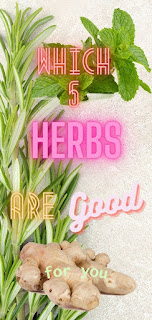A common cold is an upper respiratory tract viral infection that may include fever, runny nose, sore throat, cough, and sneezing. Many viruses, including rhinoviruses, cause the common cold and can be contracted by direct contact with infected individuals or items or by airborne droplets. While there isn't a cure for the common cold, there are treatments that may help with the symptoms.
5 Herbs that May Help You this Winter
Depending on the symptoms and severity of the cold, there are 5 herbs that may be used to treat the symptoms of the common cold at home.
The most popular 5 useful herbs are:
1. Garlic
2. Ginger
3. Echinacea
4. Thyme
5. Peppermint
Garlic
Packed with antiviral, antibacterial, and antiseptic qualities, garlic is a powerful herb. It can strengthen the immune system, reduce inflammation, and help fight against infections. It reduces the length and intensity of the symptoms although it's normally safe to eat, some people may be allergic to or intolerant to garlic. Allicin, the substance that provides garlic its therapeutic qualities, is more abundant in raw garlic, it can also irritate your stomach or give you poor breath.
You can consume raw, cooked, or as a supplement garlic. A common home cure is a calming and restorative beverage made by adding chopped up a clove of garlic, honey, and lemon juice in a boil water and leaving it to cool down for a few minutes.
While garlic cannot treat the flu or cold, it can make you feel better and heal quickly. You should also maintain proper hygiene, consume lots of water, get adequate sleep, and maintain a balanced diet to avoid becoming sick. Seek medical assistance right away if you experience breathing difficulties, a high temperature, or a severe cough.
Ginger
Another herb with antibacterial and anti-inflammatory properties is ginger. It can aid in the relief of congestion, nausea, and vomiting. You can eat ginger with food, make ginger tea, or take ginger as a tincture or tablet. Boiling some fresh ginger slices in water and adding honey and lemon juice will make a basic ginger tea.
Gingerol, a substance with anti-inflammatory and antioxidant qualities, is present in it. It has the ability to strengthen the immune system and fight illnesses including the flu, colds, and sore throats. It can help also reduce weight by speeding up metabolism and decreasing hunger.
Echinacea
Research has demonstrated that the wildflower echinacea boosts immunity and fights bacterial and viral diseases. It can reduce the severity of symptoms and help prevent or decrease the duration of colds and the flu. It is best to take echinacea as a tea, tincture, or tablet as soon as symptoms appear.
Boost your body's defences against viruses and illnesses by strengthening your immunological system. Boost the quantity of white blood cells, which are in charge of eliminating pathogens. Cut the duration of a cold and lower the chance of getting one. It possesses antioxidant, antiviral, antibacterial, and anti-inflammatory qualities to help you feel better and avoid complications.
Before taking echinacea, though, you should always see your doctor, particularly if you're pregnant, have a blood issue, or use any medications. Additionally, echinacea may have certain side effects, such as headaches, upset stomachs, or allergic reactions.
Thyme
Herbs like thyme can be used to treat colds, particularly those that cause congestion and coughing.
Thyme has expectorant, astringent, antimicrobial, antibacterial, and antiviral properties. This indicates that it has the ability to eliminate bacteria, break up mucus, and reduce respiratory tract inflammation. It can also ease gas and upset stomachs that come with colds.
Peppermint
The popular herb peppermint has been used for millennia to treat a variety of illnesses, including colds. Menthol, a natural expectorant and decongestant found in peppermint helps ease sore throats, coughs, and congestion.
Peppermint contains antibacterial and anti-inflammatory qualities that may help in the prevention of infections and reduce respiratory tract inflammation.
To make a beverage for cold, all you have to do is boil some water and pour it over a peppermint teabag in a cup. Depending on how strong you prefer your tea, cover the mug and steep the tea for three to ten minutes. To flavour, you can add milk, lemon, or honey.
Another way of making an aromatic drink is if you have fresh peppermint leaves, you should rinse them carefully and use seven to ten leaves per cup of tea. Next, crush them with a spoon or your hands to unleash the flavour and perfume. Pour boiling water into a mug with crushed leaves. For ten minutes, keep the mug covered while the tea steeps. After straining the tea, taste and add milk, lemon, or honey. This method of making peppermint tea is more flavorful and natural.
Related Posts:
10 Amazing Health Benefits of Walking
How to Stop Binge Eating at Night
5 Foods You Should Eat Everyday
Are you on Pinterest? I have a board on 'Beauty & Health Tips' that you may like. For updates, you can check my Facebook page 'Health & Beauty Tips'. |
.jpg)


Comments
Post a Comment